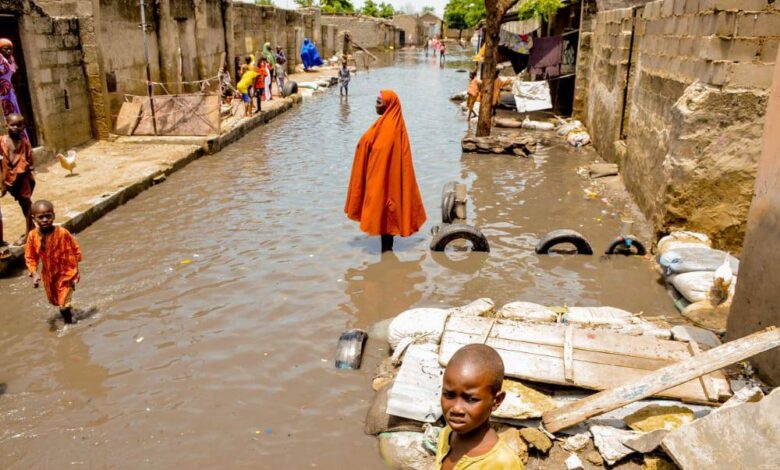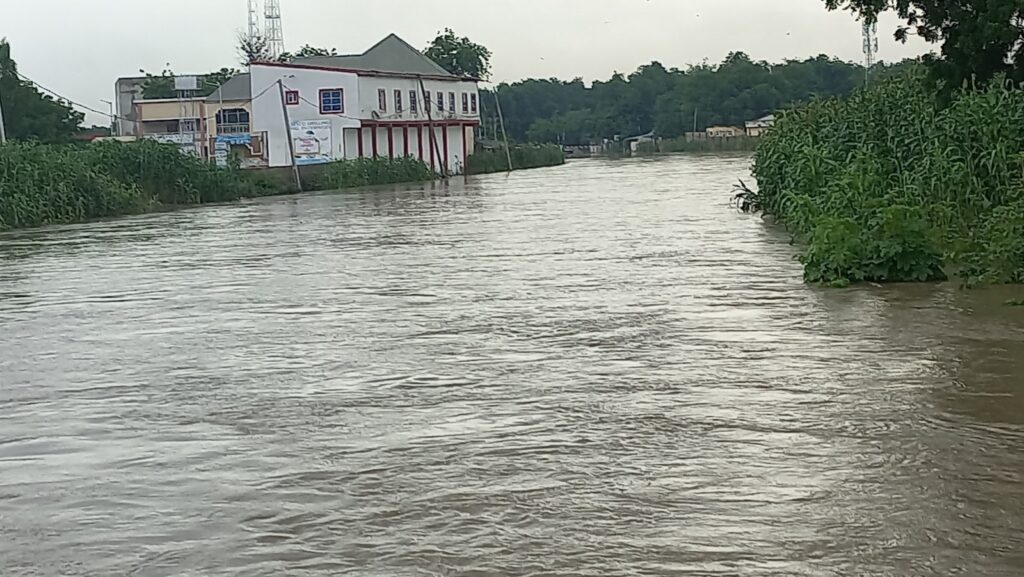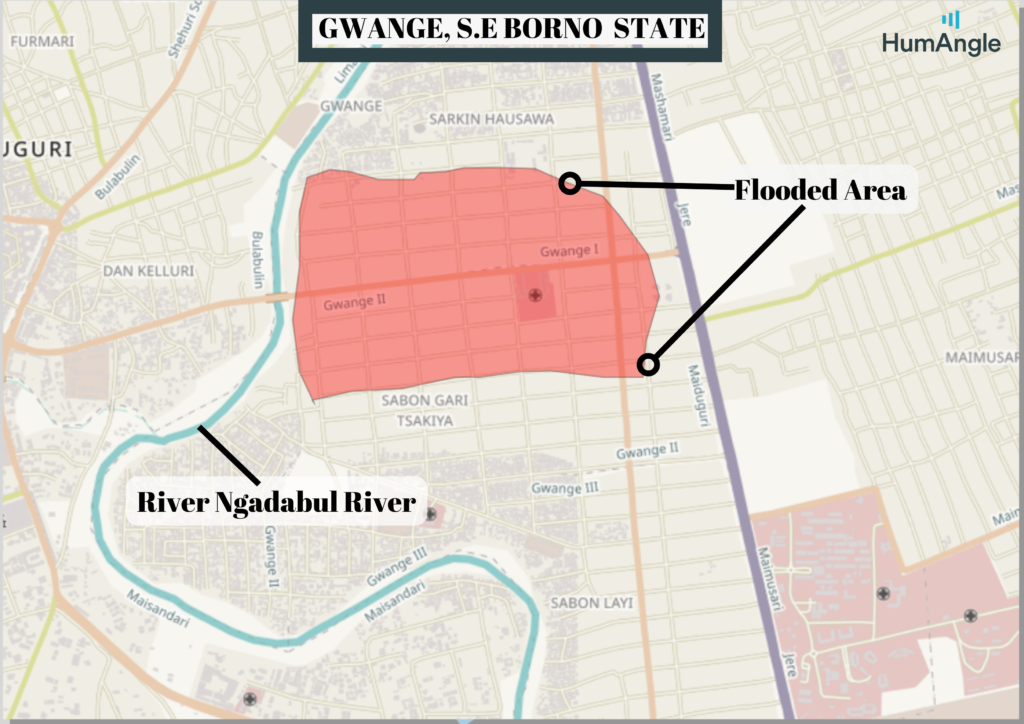Many Lives Lost As Days Of Rainfall Floods Maiduguri
The most serious flooding in nearly 30 years has wreaked havoc in the northeastern Nigerian state capital. Days of ceaseless downpour seems to be threatening the city of about two million people.

Residents of Gwange, a crowded neighbourhood of Maiduguri Borno State, Northeast Nigeria, did not sleep all through Friday night as a river that had overflown its banks poured into their homes.
The flood has also submerged other neighbourhoods through the city, causing deaths and temporarily dislodging residents.
The state government has no official toll on the number of lives lost in the raging waters, but cases of children being washed away have been reported.
In Batari, outskirts of Maiduguri, behind the now-closed Bakassi Internally Displaced Persons Camp (IDP), many farmers who had to use local canoes to cross over had drowned as their vessel capsized in the flood.
“Not many of the passengers in the boat that capsized last week survived,” said Ali Bujima, a local who witnessed the incident.
Local radios in Maiduguri have reported many cases of children being washed away by the flood while playing near river banks.
Aliyiu Ngulde, a popular radio presenter at Al-Ansar FM Radio said; “We have received reports and aired about 13 cases of children who have drowned in the river.”

Babagana Wakil, the manager of news and current affairs at Dandal Kura FM Radio in Maiduguri confirmed to HumAngle that the toll for reported cases of children’s corpses found floating in the river was 18.
“The latest was that of a deaf and dumb child who got drowned near Fori bridge. He was later found floating in the river,” Wakil said.
The river Ngadabul crisscrosses the heart of Maiduguri, intersecting highways at seven locations where overwater bridges were built. Unlike previous years, the water in the rivers has filled up to the brim and has continued to overflow their banks at the slightest downpour in the past weeks.
The surging water had risen beneath the decks of bridge clearance heights, causing it to sometimes flap over the bridges. This scary situation was seen at the Post Office bridge, as well as the Moduganari bye-pass mini bridge.
A torrential downpour that occurred from Thursday, through Friday, had caused the river to rise and overflow into the neighbourhood of Gwange I and Gwange II, leaving hundreds of households flooded.
Haruna Musa, a resident of Gwange informed HumAngle that his entire house had almost been submerged.
“It was late in the evening when my wife called me to rush back home that the flood from the river had invaded our neighbourhood,” he said.
“I had to wade through the water that was up to my knees as I went into my house to rescue my wife and children. We had to move out of the house after neighbours had assisted me move out some of my valuables. Now my wife and children have gone to my in-laws’, while I am currently squatting at a friend’s.”

Bello Danbatta, a senior official of the Borno Youth Empowerment Scheme, aka Civilian-JTF, said his groups have been helping several families to search for the corpses of their children who have been washed away by the raging flood.
“We have lost count of the number of reported cases of children and sometimes adults who have drowned in the river, and this is getting scary because the rivers are charging more and more by the day,” he said.
Threat from Cameroon
The biggest fear in Maiduguri and other parts of the state is the likelihood of Cameroon releasing water from its overfilled Lagdo Dam.
Lagdo Dam is on the Adamawa Plateau of the Northern Province of Cameroon, which shares a border with Borno, Adamawa and Taraba states in the northeastern region of Nigeria.
If Lagdo Dam is released it would risk water flowing over the Alau Dam, 20km from Maiduguri, and this could cause a repeat of the 1994 flooding disaster on Maiduguri and even beyond.
Is history about to repeat itself?
The last time Maiduguri city was this badly flooded was almost exactly 28 years ago. In September 1994 days of heavy downpour caused Alau dam to burst, the resulting flood covered several other towns along the river Ngadabul.
During the tragic incident that saw the death of seven persons, hundreds of thousands of people were also displaced from their homes.
According to a UN Department of Humanitarian Affairs report, most eastern parts of Maiduguri were engulfed by the flood that destroyed properties worth millions of naira.

Experts blame successive governments of the state for not taking action against what they termed a predictable recurrence by continually ignoring the impact of the last flood on existing waterways.
“There is no doubt that the September 1994 flood disaster that hit Maiduguri as a result of the bursting of the Alau Dam had caused what is called debris overload on the waterways of the river Ngadabul which had reduced the depth of the water channel,” said Babakura Bukar, a disaster management expert and a director in the Borno State civil service.
He added that should Cameroon lift the lid off the spillway anytime soon, the city of Maiduguri will surely be flooded again.
Bukar, who is a former director of transport at the state’s ministry of works and transport, said the only way to mitigate the impact of the flooding when the Lagdo Dam’s water comes gushing is to gradually spill the Alau Dam to reduce the already mounting pressure.
Again, that unless specific and crucial prevention measures are taken, Maiduguri and its vicinity will continue to suffer the consequences of climate change “that keeps manifesting in the rain pattern. “
Suggested way out
“One of the first steps to take is for the government to embark on dredging of River Ngadabul to deepen the channels to achieve faster discharge of water into the deep slope of the river,” Bukar said.
Also, dredging would reclaim the original depth of the river and prevent further land formation within it. So, when the debris load is removed, the river can retain water for a longer time.
When the river channel is deepened through dredging, water would be preserved for a longer period which enhances other economic activities like fishing. Also, water transportation would be possible, which could reduce pressure on the city’s roads and enhance revenue generation.
Bukar added that the dredging of River Ngadabul can be done in collaboration with the National Inland Waterways Authority area office in Maiduguri because they have their dredging equipment in Borno State.
“If the state government can embark on the immediate dredging of the river channels, a lot of benefits would be gained including knowledge and skills transfer.
The Borno State government has mandated a standing committee on flooding headed by Barrister Kaka-Shehu Lawan, a former attorney general of the state, to monitor the situation and make recommendations to the government on how to tackle the situation. But the committee could not be reached at the time this report was filed.

Support Our Journalism
There are millions of ordinary people affected by conflict in Africa whose stories are missing in the mainstream media. HumAngle is determined to tell those challenging and under-reported stories, hoping that the people impacted by these conflicts will find the safety and security they deserve.
To ensure that we continue to provide public service coverage, we have a small favour to ask you. We want you to be part of our journalistic endeavour by contributing a token to us.
Your donation will further promote a robust, free, and independent media.
Donate HereStay Closer To The Stories That Matter




